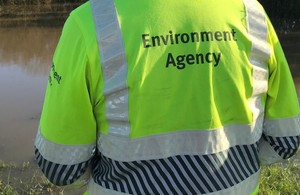Environment Agency publishes storm overflow spill data for 2023
100% of storm overflows now fitted with monitoring devices required by the government.

The Environment Agency has published its Event Duration Monitoring (EDM) data for 2023 showing the frequency and duration of spills from storm overflows in England.
Storm overflow spills are measured by event duration monitors and 100% of storm overflows across the water network are now fitted with these, meeting the target set by the government to do so by the end of 2023. With just 7% of storm overflows fitted with a monitor in 2010, England is now a world leader in the number of storm overflows monitored.
Event Duration Monitoring data was returned from 14,318 storm overflows during the calendar year of 2023, up from 13,313 in 2022 and 12,092 in 2020. It is important to note that the increased installation of monitors over this period makes any direct comparisons of spill data over time very difficult.
The data for 2023 shows a 54% increase in the number of sewage spills compared to 2022, and a 13% increase compared to 2020. The increase in spills compared to 2022 is partly because 2023 was named by the Met Office as the 6th wettest year since its records began in 1836.
The data also shows that in 2023:
- The average number of spills per overflow was 33 compared to 23 in 2022 and 32.6 in 2020;
- 40% of storm overflows spilled less than 10 times in 2023 compared to 48% in 2022 and 40% in 2020;
- 13.9% of storm overflows did not spill at all in 2023 compared to 18% in 2022 and 13% in 2020.
In terms of rainfall, 2020 is the most comparable year to 2023 with EDM data available. Rainfall is the primary driver of storm overflow spills, given surface water run-off can put pressure on England’s combined sewer network.
However, it is important to note that heavy rainfall does not affect water companies’ responsibility to manage storm overflows in line with legal requirements.
We will use this data to inform compliance and investigation work. It provides a clear framework for where water companies should focus their investment.
The Environment Agency takes enforcement action when illegal discharges from storm overflows are identified. Last month, a fourfold increase in the number of water company inspections was announced to uncover any water industry non-compliance with environmental permits.
Environment Agency Director of Water Helen Wakeham said:
Whilst it is disappointing that water companies have reported an increase in sewage spills in 2023, it is sadly not surprising. We are pleased to see record investment from the water sector, but we know it will take time for this to be reflected in spill data – it is a complex issue that won’t be solved overnight.
No other country has the level of monitoring we do, with 100% of storm overflows in England now fitted with a monitor. We are better placed than ever before to hold water companies accountable – thanks to intelligence from our new whistleblower portal, our plans to expand our specialised workforce, new enforcement powers, increased water company inspections and new tools to inform our enforcement work.
Water Minister Robbie Moore said:
I have been clear that sewage pollution in our waters is unacceptable, which is why in just the last few months we announced a consultation to ban water bosses’ bonuses when criminal breaches have occurred, quadrupled company inspections next year, fast-tracked £180m investment to cut spills, launched a whistleblowing portal for water company workers to report breaches, and will soon set out our plans to ban wet wipes containing plastic.
We demanded that 100% of overflows were monitored by the end of last year as part of our drive to improve transparency. Today’s data shows water companies must go further and faster to tackle storm overflows and clean up our precious waterways. We will be ensuring the Environment Agency closely scrutinise these findings and take enforcement action where necessary.”
The publication includes data from all 10 water and sewerage companies. With 100% of storm overflows now monitored, data-driven analytics is helping the Environment Agency to map discharges against rainfall more effectively, better identifying non-compliance and taking action against illegal activity. For the first time, the data is presented in an interactive data portal, making it more accessible to members of the public.
The government is urging water companies to go further and faster wherever possible to tackle sewage pollution. The Environment Secretary recently announced £180m in fast-tracked water company investment over the next 12 months, expected to prevent more than 8000 sewage spills polluting English waterways.
A new portal was also launched this week to make it easier for internal water company whistleblowers to safely report serious environmental wrongdoing by their water companies. Any findings can be used to support enforcement action against companies, if appropriate, including unlimited financial penalties and criminal prosecution.
The EA is already conducting the largest ever criminal investigation into potential widespread non-compliance by water and sewerage companies at thousands of sewage treatment works. Since 2015, the EA has concluded 60 prosecutions against water and sewerage companies securing fines of over £150 million.
In February, the government announced a ban on water company bosses receiving bonuses if a company has committed serious criminal breaches. The ban would apply to all executive board members and Chief Executives and is set to come into effect later this year.
Additionally, it was announced earlier this year that, subject to consultation, EA water company inspections will rise to 4,000 a year by the end of March 2025 and then to more than 10,000 from April 2025. This will include an increase in unannounced inspections – strengthening oversight of water companies and providing greater assurance alongside operator self-monitoring.
Updates to this page
-
Amended to add a hyperlink to the data.
-
First published.